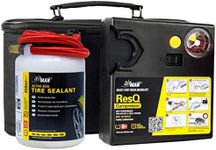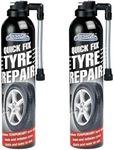Buying Guide for the Best Tyre Sealants
Choosing the right tyre sealant can be crucial for maintaining your vehicle's performance and safety. Tyre sealants are designed to quickly seal punctures and prevent air loss, which can be a lifesaver in emergency situations. When selecting a tyre sealant, it's important to consider the type of vehicle you have, the typical driving conditions you encounter, and your personal preferences for ease of use and longevity. Understanding the key specifications of tyre sealants will help you make an informed decision that best suits your needs.Type of SealantTyre sealants come in two main types: liquid and aerosol. Liquid sealants are poured directly into the tyre and are often used as a preventative measure, sealing punctures as they occur. Aerosol sealants are sprayed into the tyre through the valve and are typically used for emergency repairs. If you frequently drive in areas with debris or sharp objects, a liquid sealant might be more suitable for ongoing protection. For those who prefer a quick fix in case of a flat, an aerosol sealant could be more convenient.
CompatibilityNot all tyre sealants are compatible with every type of tyre. Some are specifically designed for tubeless tyres, while others can be used with both tubed and tubeless tyres. It's important to check the product specifications to ensure compatibility with your vehicle's tyres. If you're unsure, consult your vehicle's manual or a professional to determine the type of tyres you have and choose a sealant that matches.
LongevityLongevity refers to how long the sealant remains effective inside the tyre. Some sealants are designed to last for a few months, while others can last for years. If you are looking for a long-term solution, opt for a sealant with a longer lifespan. However, if you only need a temporary fix or plan to replace your tyres soon, a sealant with a shorter lifespan may suffice.
Temperature RangeThe temperature range of a tyre sealant indicates the environmental conditions in which it can effectively operate. Some sealants are formulated to work in extreme cold or heat, while others are more suited to moderate climates. Consider the typical weather conditions in your area when choosing a sealant. If you live in a region with harsh winters or hot summers, ensure the sealant you choose can withstand those temperatures.
Ease of UseEase of use is an important factor, especially if you plan to apply the sealant yourself. Some products come with applicators or are designed to be user-friendly, requiring minimal tools or expertise. If you're not comfortable with DIY applications, look for a sealant that is straightforward to use or consider having it applied by a professional. Your comfort level with the application process should guide your choice here.
















